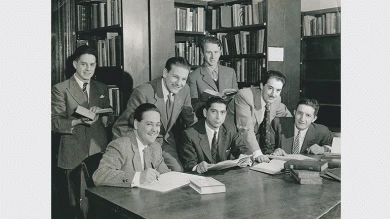-
Wednesday, 20 and Tuesday, 26 March – 7pm / Nouvel Building, Library and Documentation Centre, Space D
Incomplete Times. Chile, First Laboratory of Neoliberalism
Exhibition opening, and guided tour led by Nelly Richard
Wednesday, 20 March – 7pm
Opening
Admission: free, until full capacity is reachedTuesday, 26 March – 7pm
Guided tour
Admission: free, with prior registration required by filling out the following form
Capacity: 20 placesThe 1973 coup d’état in Chile signalled the break-up of the historical narrative of the Popular Unity alliance and the establishment of a 17-year dictatorship ruled by Augusto Pinochet. The consolidation of such a dictatorship combined state terrorism with the economic ‘shock doctrine’ implemented by the Chicago Boys to turn the country into the first laboratory of neoliberalism on a global scale.
Artists and activists retrieve iconic images from that traumatic event in an overlapping of time – past, present, future – that shook the fabric of neoliberalism in Chile. Thus, the strata of social memory are upheld in a continued variation, enabling the axes of historical temporality (retrospection and prefiguration) to swing surprisingly in unexpected directions.
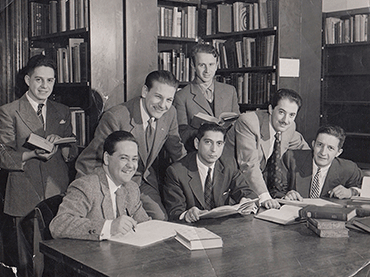
-
Monday, 25 and Tuesday, 26 March – 11am / Nouvel Building, Study Centre
Chile: The Critical Operations of Memory
Seminar conducted by Nelly Richard
Admission: free, with prior registration by filling out the following form
Capacity: 35 placesThe seminar Chile: The Critical Operations of Memory looks between certain folds of Chile’s social historicity which mark the passage from dictatorship to transition by way of the relationship between art and critical thought. Therefore, creative strategies facilitating experimental artistic practices are explored, venturing, firstly, to bend the authoritarian/repressive framing of the dictatorship, before activating dissent (conflicts of memory, identity and gender) in the falsely inclusive landscape of political and social consensus and the market which unfolded during the transition.
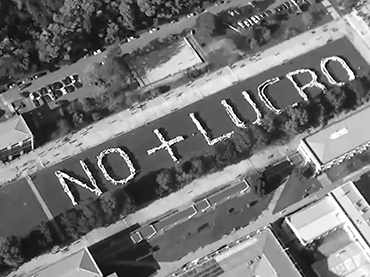
-
Wednesday, 27 March – 7pm / Nouvel Building, Auditorium 200
Bodies and Memories from the Transition in Latin and America and Spain: Feminist Re-Readings
Round-table discussion with Maite Garbayo, Ana Longoni, Nelly Richard and María Rosón
Admission: free, until full capacity is reached
Feminisms put forward a critical narrative of the bodies that crossed the threshold between dictatorship and post-dictatorship, from the disputes between morality and sexuality, the conflicts of representation and public visibility in the symbol of the ‘woman’, and the performative force of some of their mise en scènes.
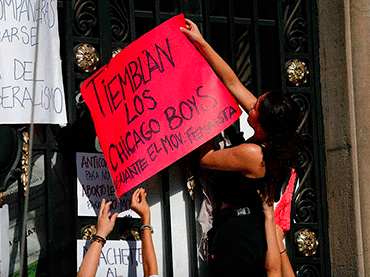
The Politics and Aesthetics of Memory
A Survey of Transitions in Latin America and Spain
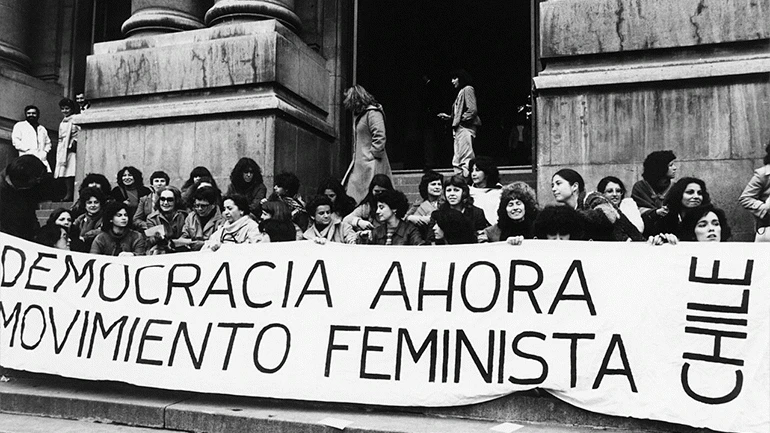
Held on 24 Mar 2019
The line of force The Politics and Aesthetics of Memory, coordinated by Chilean theorist Nelly Richard, brings into focus different initiatives of training, research and public activities in the Museo Reina Sofía. The programme’s point of departure is the conception of memory, not as a fixed gaze on a concluded past but as an agent to decipher and re-read fragments and settings, procedures and narratives, rhetoric and politics of the body and image that continue to question the present with their force of performance. To survey these past/present materials entails strengthening multiple senses, in friction at the crossroads between art, subjectivity, social discourse, culture and institutions.
On this occasion, the programme shines a light on cases in Spain and the Southern Cone of South America, starting, firstly, with the unveiling of the exhibition Incomplete Times. Chile, the First Neoliberal Laboratory, in the Museo’s Library and Documentation Centre (from 21 March to 24 May 2019), and the guided tour by its curator, Nelly Richard. The show brings together different artistic and activist practices which explore the economic ‘shock doctrine’, developed by the Chicago Boys to turn Chile into the first global neoliberal laboratory under Augusto Pinochet’s dictatorship.
Secondly, the seminar Chile: The Critical Operations of Memory, conducted by Nelly Richard, seeks to look between certain folds in Chile’s social historicity which mark the passage from dictatorship to transition, considering the relationship between art and critical thought.
The programme concludes with the round-table discussion Bodies and Memories of the Transition in Latin America and Spain: Feminist Re-Readings, featuring the participation of Maite Garbayo, Ana Longoni, Nelly Richard and Clara Serra. Together, through feminist narratives, they analyse conditions of transition in Spain, Chile and Argentina, vying for the subjective footprints that make up identity, sexuality and gender, and the emergence – past and present – of women as a collective subject of political articulation and social transformation to be vectors of commotion in the unstable and essential exercise of these historical re-writings.
Inside the framework of the line of force
The Politics and Aesthetics of Memory
Organised by
Museo Reina Sofía, Study Centre
Educational program developed with the sponsorship of

Más actividades

Difficulty. Forms and Political Effects of Deviation in Writing and Contemporary Art
23 February – 14 December 2026 – Check programme
Difficulty. Forms and Political Effects of Deviation in Writing and Contemporary Art is a study group aligned towards thinking about how certain contemporary artistic and cultural practices resist the referentiality that dominates the logics of production and the consumption of present-day art. At the centre of this proposal are the concepts of difficulty and deviation, under which it brings together any procedure capable of preventing artistic forms from being absorbed by a meaning that appears previous to and independent from its expression. By ensuring the perceptibility of their languages, difficulty invites us to think of meaning as the effect of a signifying tension; that is, as a productive and creative activity which, from the materiality of art objects, frees aesthetic experience from the representational mandate and those who participate in it from the passiveness associated with tasks of mimesis and decoding.
The economy of the referential norm translates the social logic of capitalism, where insidious forms of capturing subjectivity and meaning operate. In the early 1980s, and adopting a Marxist framework, poet Ron Silliman highlighted how this logic entailed separating language from any mark, gesture, script, form or syntax that might link it to the conditions of its production, rendering it fetichised (as if without a subject) and alienating its users in a use for which they are not responsible. This double dispossession encodes the political strategy of referential objectivity: with no subject and no trace of its own consistency, language is merely an object, that reality in which it disappears.
The political uses of referentiality, more sophisticated today than ever before, sustain the neoliberal-extractivist phase of capitalism that crosses through present-day societies politically, economically and aesthetically. Against them, fugitive artistic practices emerge which, drawing from Black and Queer studies and other subaltern critical positions, reject the objective limits of what exists, invent forms to name what lies outside what has already been named, and return to subjects the capacity to participate in processes of emission and interpretation.
Read from the standpoint of artistic work, the objective capture of referentiality may be called transparency. Viewed from a social contract that reproduces inequality in fixed identity positions, transparent in this objectivity are, precisely, the discourses that maintain the status quo of domination. Opposite the inferno of these discourses, this group aims to collectively explore, through deviant or fugitive works, the paradise of language that Monique Wittig encountered in the estranged practices of literature. For the political potency of difficulty — that is, its contribution to the utopia of a free language among equals — depends on making visible, first, its own deviations; from there, the norm that those deviations transgress; and finally, the narrowness of a norm which in no way exhausts the possibilities ofsaying, signifying, referring and producing a world.
From this denouncement of referential alienation, fetishisation and capture, Difficulty. Forms and Political Effects of Deviation in Writing and Contemporary Art turns its attention to the strategies of resistance deployed by contemporary artists and poets. Its interest is directed towards proposals as evidently difficult or evasive as those of Gertrude Stein, Lyn Hejinian, Theresa Hak Kyung Cha, Kameelah Janan Rasheed, Kathy Acker, María Salgado and Ricardo Carreira, and as seemingly simple as those of Fernanda Laguna, Felix Gonzalez Torres and Cecilia Vicuña, among other examples that can be added according to the desires and dynamics of the group.
The ten study group sessions, held between February and December, combine theoretical seminars, work with artworks from the Museo Reina Sofía’s Collections and exhibitions, reading workshops and public programs. All these formats serve as spaces of encounter to think commonly about certain problems of poetics — that is, certain political questions — of contemporary writing and art.
Difficulty. Forms and Political Effects of Deviation in Writing and Contemporary Art inaugurates the research line Goodbye, Representation, through which the Museo Reina Sofía’s Studies Directorship seeks to explore the emergence of contemporary artistic and cultural practices which move away from representation as a dominant aesthetic-political strategy and redirect their attention toward artistic languages that question the tendency to point, name and fix, advocating instead for fugitive aesthetics. Over its three-year duration, this research line materializes in study groups, seminars, screenings and other forms of public programming.

Institutional Decentralisation
Thursday, 21 May 2026 – 5:30pm
This series is organised by equipoMotor, a group of teenagers, young people and older people who have participated in the Museo Reina Sofía’s previous community education projects, and is structured around four themed blocks that pivot on the monstrous.
This fourth and final session centres on films that take the museum away from its axis and make it gaze from the edges. Pieces that work with that which is normally left out: peripheral territories, unpolished aesthetics, clumsy gestures full of intent. Instead of possessing an institutional lustre, here they are rough, precarious and strange in appearance, legitimate forms of making and showing culture. The idea is to think about what happens when central authority is displaced, when the ugly and the uncomfortable are not hidden, when they are recognised as part of the commons. Film that does not seek to be to one’s liking, but to open space and allow other ways of seeing and inhabiting the museum to enter stage.

Intergenerationality
Thursday, 9 April 2026 – 5:30pm
This series is organised by equipoMotor, a group of teenagers, young people and older people who have participated in the Museo Reina Sofía’s previous community education projects, and is structured around four themed blocks that pivot on the monstrous.
The third session gazes at film as a place from which to dismantle the idea of one sole history and one sole time. From a decolonial and queer perspective, it explores films which break the straight line of past-present-future, which mix memories, slow progress and leave space for rhythms which customarily make no room for official accounts. Here the images open cracks through which bodies, voices and affects appear, disrupting archive and questioning who narrates, and from where and for whom. The proposal is at once simple and ambitious: use film to imagine other modes of remembering, belonging and projecting futures we have not yet been able to live.

Remedios Zafra
Thursday March 19, 2026 - 19:00 h
The José Luis Brea Chair, dedicated to reflecting on the image and the epistemology of visuality in contemporary culture, opens its program with an inaugural lecture by essayist and thinker Remedios Zafra.
“That the contemporary antifeminist upsurge is constructed as an anti-intellectual drive is no coincidence; the two feed into one another. To advance a reactionary discourse that defends inequality, it is necessary to challenge gender studies and gender-equality policies, but also to devalue the very foundations of knowledge in which these have been most intensely developed over recent decades—while also undermining their institutional support: universities, art and research centers, and academic culture.
Feminism has been deeply linked to the affirmation of the most committed humanist thought. Periods of enlightenment and moments of transition toward more just social forms—sustained by education—have been when feminist demands have emerged most strongly. Awareness and achievements in equality increase when education plays a leading social role; thus, devaluing intellectual work also contributes to harming feminism, and vice versa, insofar as the bond between knowledge and feminism is not only conceptual and historical, but also intimate and political.
Today, antifeminism is used globally as the symbolic adhesive of far-right movements, in parallel with the devaluation of forms of knowledge emerging from the university and from science—mistreated by hoaxes and disinformation on social networks and through the spectacularization of life mediated by screens. These are consequences bound up with the primacy of a scopic value that for some time has been denigrating thought and positioning what is most seen as what is most valuable within the normalized mediation of technology. This inertia coexists with techno-libertarian proclamations that reactivate a patriarchy that uses the resentment of many men as a seductive and cohesive force to preserve and inflame privileges in the new world as techno-scenario.
This lecture will address this epochal context, delving into the synchronicity of these upsurges through an additional parallel between forms of patriarchal domination and techno-labor domination. A parallel in which feminism and intellectual work are both being harmed, while also sending signals that in both lie emancipatory responses to today’s reactionary turns and the neutralization of critique. This consonance would also speak to how the perverse patriarchal basis that turns women into sustainers of their own subordination finds its equivalent in the encouraged self-exploitation of cultural workers; in the legitimation of affective capital and symbolic capital as sufficient forms of payment; in the blurring of boundaries between life and work and in domestic isolation; or in the pressure to please and comply as an extended patriarchal form—today linked to the feigned enthusiasm of precarious workers, but also to technological adulation. In response to possible resistance and intellectual action, patriarchy has associated feminists with a future foretold as unhappy for them, equating “thought and consciousness” with unhappiness—where these have in fact been (and continue to be) levers of autonomy and emancipation.”
— Remedios Zafra

27th Contemporary Art Conservation Conference
Wednesday, 4, and Thursday, 5 March 2026
The 27th Contemporary Art Conservation Conference, organised by the Museo Reina Sofía’s Department of Conservation and Restoration, with the sponsorship of the Mapfre Foundation, is held on 4 and 5 March 2026. This international encounter sets out to share and debate experience and research, open new channels of study and reflect on conservation and the professional practice of restorers.
This edition will be held with in-person and online attendance formats, occurring simultaneously, via twenty-minute interventions followed by a five-minute Q&A.
